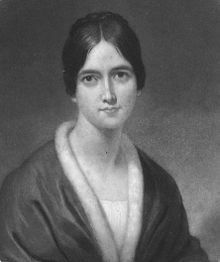
Fanny Osgood
There were many exquisite women poets in the 19th century, but since “modern” means more than “women” in poetry, very few of them are read anymore. Dickinson, really. And that’s it.
In this contest the great John Donne takes on an American poetess from the 19th century, rumored (rumor only!) to have had an affair with Edgar Poe. He supported her in reviews.
She spoke not—but, so richly fraught
With language are her glance and smile,
That, when the curtain fell, I thought
She had been talking all the while.
–Fanny Osgood
Death be not proud, though some have called thee
Mighty and dreadful, for thou are not so;
For those whom thou think’st thou dost overthrow
Die not, poor Death, nor yet canst thou kill me.
–John Donne
Why do we think these 19th century women poets were not modern? They were. And one can certainly see why they thought they were being “modern.”
Just compare the two—John Donne:
For those whom thou [a personified Death] think’st thou dost overthrow
to Fanny Osgood:
She [an actual person] had been talking all the while.
Fanny Osgood is a modern writer. Why is she forgotten, then?
T.S. Eliot—part of the male Poetry & Criticism clique, with Pound, of High Modernism, (only Marianne Moore was allowed to join the club as a token)—championed the “Metaphysical Poets” (the term was actually coined by Samuel Johnson, who found fault with the same group) and Donne was one of these heralded ‘Metaphysicals’ for Eliot, who busily damned Shelley, Milton, and Shakespeare, and unlike Poe, seemed to find no female poets to his liking.
Donne, sounding like a school boy, tells someone named “Death” you’re not so “mighty” and you cannot “kill me.”
The whole thing is laughable, and really belongs more to Theosophical Wit than Poetry.
Donne is done in by his own logic; he says that if a nap is good, death must be better—and yet we wake up from a nap.
The chief secretary of the Lord Keeper of the Great Seal (Donne’s position for a while) also says that “our best men” end up with Death, but this, apparently makes Death bad, the same as when “desperate men” go with him.
And Death is apparently not “mighty” because he hangs out with “war.”
The real wit is achieved at the end, which basically says if we do wake up after we die, as with a nap, then, and only then: “Death, thou shalt die.” Which is only to be expected.
Contrast this with Fanny Osgood’s passage in March Madness 2017.
According to Poe, this is the best kind of poetry, “breathing Nature,” with “nothing forced or artificial.”
Osgood describes beautifully a woman who speaks without speaking.
Here are the two quatrains which precede the one quoted:
Now gliding slow with dreamy grace,
Her eyes beneath their lashes lost,
Now motionless, with lifted face,
And small hands on her bosom crossed.And now with flashing eyes she springs—
Her whole bright figure raised in air,
As if her soul had spread its wings
And poised her one wild instant there!She spoke not—but, so richly fraught
With language are her glance and smile,
That, when the curtain fell, I thought
She had been talking all the while.
Fanny Osgood has defeated the immortal John Donne! A mighty upset! Death, art thou shocked?